“German novelists on the fall of the Berlin wall: ‘It was a source of energy we lived off for years’”, The Observer
Julia Franck, Heike Geissler, Maxim Leo, Norman Ohler, Bernhard Schlink, London, November 3, 2019
Thirty years ago, the people of Berlin brought down the wall that had cut through their city since 1961. Here five writers, from both sides of the divide, recall those heady days and assess their legacy
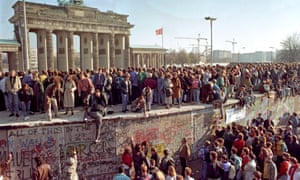
November 1989: Berliners congregate near Brandenburg Gate to celebrate the fall of the wall. Photograph: Andree Kaiser/Alamy
Heike Geissler: ‘For the first few years, I fell into every single consumer trap put in my way’
Heike Geissler was born in 1977 in Riesa in the former German Democratic Republic. She is the author of four novels, most recently Seasonal Associate, a highly acclaimed fictionalised account of a period she spent working in an Amazon warehouse in Leipzig.
Oh, it’s all so long ago, isn’t it? When the wall came down I was 12 years old and crazy about belongings and about the world. I was embarrassed about coming from the GDR. I was embarrassed about going into shops in West Germany and being a grey and dark-blue complex of drab timidity amidst all the colours. With my first western money I bought myself a neon-coloured rucksack and a cassette recorder. I was already more colourful when I travelled with my mother in a packed train to Oberhausen in West Germanyto see the acquaintances who had for years been sending us parcels for feast days and birthdays. I ate yoghurt for the first time, and liked it, and I draped myself in colours. Autumn colours were chic at the time: purple, ochre, etc.
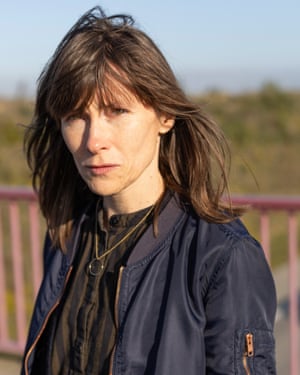
Maybe I’d just lost interest in politics. If only I knew. At any rate Ernst Thälmann (the leader of the Communist Party who was later shot in Buchenwald) had recently been my hero, I’d wanted to be like him, and I’d thought about how he had managed to fashion a little inkwell with the bread that a prison warder had given him, fill it with milk and thus have a source of invisible ink that he could eat straight away if he had to. I wondered about that, and a moment later I wondered what it would be like to live with Martin Lee Gore (of synth-pop band Depeche Mode). I papered my room with posters of him, I dreamt about him, I was, even though I wasn’t quite a grown-up, Martin Lee Gore’s wife.
You probably didn’t know that before, but now you do. What I didn’t know for a long time: I was a torment to my parents, because capitalism now gripped me as firmly by the hand as the Pioneer Organisation had done before. As soon as it was there I was its willing talking doll, its passionate advocate, and I was right at the front of the queue of people buying and coveting consumer goods. I appropriated externals as if nothing else existed, and spent all my time observing who had what, and who had more, and established without much difficulty that we had less. To be precise, that was how things had seemed to me even before the wall came down, but now the differences were getting bigger. I couldn’t see what was being lost. I’ve only come to see it recently. I could see only what I didn’t have, and I was busy making demands and seeing those demands become reality. I never made any political demands, so for example I never complained in a public place about the new and much more visible distribution of money and opportunities; instead all my demands were made on my parents.
So I think I spent the years of growth after the fall of the GDR shopping. I barely knew how to do anything else but seek out those swiftly erected tent constructions full of cardboard boxes that contained all kinds of wonderful and desirable-looking cheap clothes, and later the new branches of large chains, afternoon after afternoon, and looking, wanting, buying. In retrospect I hold my hand up in front of my nose, because it smells of smoke. I remember that the nearby block where the Vietnamese guest-workers lived was said to be on fire. It’s clear in my memory that the fire had been started deliberately. I see people running, I see the excitement, I sense it, but perhaps it wasn’t even on fire, I’m not sure. But I remember very clearly that something was on fire somewhere for a while.
Forgive me, I wanted to talk about my behaviour as a consumer and how it changed, but I got distracted.
Forgive me again. I worked out that I didn’t want to say anything more about my behaviour as a consumer, because what is there to say about it that you yourself haven’t known for ages? So for the first few years after the fall of the wall I became a master at falling into every single consumer trap put in my way, over and over again. I am, and perhaps you need to know this, the child of determined players of the lottery. What we lived on, what fed us, was the hope of a big win, never the hope of political change. I am the daughter of a mother who rationalised herself out of her own job in 1992 whether out of negligence or honesty or both, I’m not sure. I am the daughter of a father who dreamt of reaching the age of retirement years before he actually retired. I see my father sitting in the living-room in the morning. The living room in this low-rise on the edge of the forest looks like a diorama with a set that could have been made for a post-wall museum: Father (38) on short time sitting silently in his armchair. The armchair is turned towards the television. The television is off. There is no sound in the living-room. The father is the silent type anyway. The daughter stands on the edge of the diorama, between the dining area and the corridor, looking at the father; her mouth is half-open and she is dreaming about the world, and secretly of being a global star, although nothing came of it.
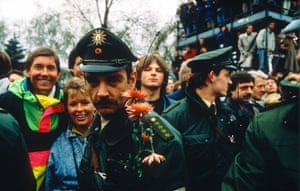
I’m a writer, I was born in the former GDR, I live in the state of Saxony, notorious for its strong rightwing scene. You could describe me as an east German, but I place no value on that, I’m not comfortable with the term, and I’m not trying to become comfortable with it either. When I think east German and at the same time think west German, I immediately think about how my country was sold off piecemeal, about how lives were devalued, about how conversations were curtailed, and I think about solutions other than the unification of the two German states. Solutions which were discussed, which could have happened and which, from the perspective of the present day – when for example all needs can be satisfied with a small amount of money and when pretty much all properties are sold and all districts gentrified – seem more exciting and worthwhile than the status quo, which everybody I know finds extremely tiring. The term east German triggers unpleasant memories about my own greed, about GDR citizens’ desire for the Deutschmark, and their urging towards the unification of the two German states. It’s a phrase that also conjures up injustices. I’m thinking about west Germans who were eloquently and jovially able to impress, who occupied lucrative positions and transferred to us structures from their own country which I was unable to examine and question at the time. (As I said, I only ever thought about consumption.) I think about articles that still forget to mention the existence of the GDR or just mention it in self-justificatory sub-clauses to do their duty. I think of imperfection, repression and miscommunication. But I don’t want to describe myself as an east German because I think that would mean getting involved in a competition for media attention and helping to set one past against another. Emotional though it might sound, what’s needed is exchange rather than boundaries, so while I may have been a citizen of the GDR I’m not prepared to become an east German. I’m a German, because my passport tells me so. That’s label and challenge enough. Translated by Shaun Whiteside
Maxim Leo: ‘Let me tell you a funny east German story…’
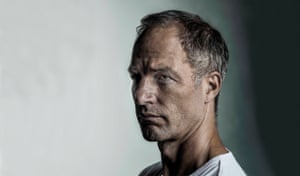
Germans like anniversaries; they give such a clear shape to history. At these times you can simplify complicated things a bit, smooth out the contradictions. The GDR, which repeatedly comes back to life on these dates, long ago became a kind of museum country. These days hardly anybody wants to know what the East German state was really like; instead the same stories are told over and over again, about very brave civil rights activists or very nasty Stasi people. Normal people seldom appear in these stories, and the German Democratic Republic has long since rigidified into a historical caricature.
That is primarily because west Germans don’t want to know anything at all; they simply want confirmation that they were on the right side and east Germans were on the wrong side. West Germans also like it when you’re grateful to them for sharing their wealth and their constitution with us [former east Germans]. If you’re not grateful enough, west Germans get angry.
For their part, east Germans stopped explaining themselves ages go. Sometimes they still point out hesitantly that it didn’t rain all the time even in the GDR, that even under a dictatorship people were able to fall in love. That a genuinely normal life was possible even in a non-normal country. But then people in the west start wailing that the dictatorship is being played down, the GDR is being nostalgically transformed. So east Germans fall silent again, because what’s the point?
I myself always feel bad on these big anniversaries, because I can’t help remembering the student from Düsseldorf that I met at my first party in west Berlin shortly after the fall of the wall. I had just bought a Billy bookcase at Ikea with my DM100 welcome money. When I was assembling the shelves I’d accidently hit my thumb with the hammer. My thumbnail was brown and swollen. At the party the student from Düsseldorf asked me what had happened to my thumb. I told him that in school in the GDR they hit you on the thumb with a hammer if you didn’t do your homework. And because I forgot my homework a lot, after 10 years of torture my thumb was pretty much beyond saving.
The student gave me a look full of surprise and pity. He would probably have believed me if I’d told him that pupils with bad marks were shot at the end of the school year. For those young west Germans the GDR was so completely wicked anything was imaginable. I wanted to confess that evening, tell the student I’d been talking nonsense, but we lost sight of each other and I never saw him again. Since then, every anniversary, I imagine the student from Düsseldorf, years later, telling his children about that strange east Berliner with the battered thumb, that torture victim of the rogue East German state. So I’m not entirely innocent when it comes to the fact that the GDR only exists nowadays as a horror version of itself.
Also regular as clockwork on the anniversary come the reports about the state of German unity. And each time there’s a huge sense of disappointment because east Germans are still so different. So strange, so ungrateful, so hard to train. East Germans vote for the right, they don’t like foreigners, they don’t believe in God, they eat a lot of meat and hardly have any children, but they do have a higher than average amount of sex. Worst are east German men, who are seen as left behind, frustrated, aggressive, uneducated, racist, homeless, wifeless. Has there, since Gollum from Lord of the Rings, been an uglier creature than the east German man?
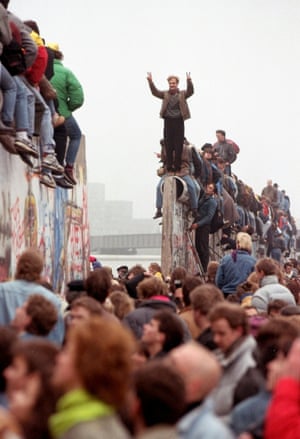
I write these lines as an aggrieved party. I’ve been an east German man since I was born. And I’m often asked to appear as crown witness; particularly on anniversaries I’m supposed to explain myself and my odd compatriots. Last week a woman called me up from the radio. She said she’d like to do an interview. With me as an east German. “Perhaps you could give us a bit of an introduction to some of the peculiarities of east Germans,” she said. It sounded as if I was a native of Papua New Guinea.
A few days earlier, Deutsche Welle radio had given me a call, as had a paper from Munich and a French radio station. They all urgently need east Germans for the big anniversary. “As witty as possible”, “as original as possible”, “with a wink, you know, Mr Leo”. That’s the new trend in the GDR history business. A few years ago people in the west only wanted to hear sad stories; now the tales have to be funny. No problem. Over the years I’ve become a professional east German. If people want Stasi, I give them Stasi. And if people want to laugh, I’ll keep chucking those funny stories at them until the earth shakes.
I hadn’t planned to be a professional east German. You might say I just slipped into it. There was a great need for east German stories and, to be honest, I needed the money. Ten years ago, at the last big anniversary, I had written a book about my East German family. I did a reading tour and, after many evenings in the west German provinces, I was lying in bed in the Intercity Hotel in Celle one night, thinking about how damned ironic history is: who would have expected the GDR, of all places, to involve so much world travel?
Recently, incidentally, I’ve felt very close to the British, because so many people are disappointed by the British right now, and no one really understands the British any more. I have an idea: how about the British split from Northern Ireland and unify with east Germany instead? I see a lot of parallels and advantages there. But let’s talk about that some other time, when we’ve got a bit of peace and quiet. Translated by Shaun Whiteside
Bernhard Schlink: ‘East and West Germans were curious about each other, delighted in each other’
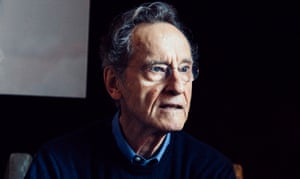
Bernhard Schlink is a writer, lawyer and academic. Born in Heidelberg in 1944, he now divides his time between Berlin and New York. His best-known book is The Reader, an international bestseller which was made into a film, starring Kate Winslet, in 2008 by Stephen Daldry.
The wall fell on 9 November 1989. A few days later I was in Berlin – history was being made here, and I wanted to be part of it.
East Berliners were out and about in West Berlin, easy to spot thanks to their cars, their clothes, the way they inspected shop displays, the bananas and oranges in their shopping bags. At the border, the East German Volkspolizei were friendly, in contrast to their earlier attitude, and in East Berlin I could walk into Humboldt University without going through the security check that had previously been obligatory. Otherwise people did what they always do; they went to work, did their shopping, sat in cafés. History is everyday life.
But that November everyday life was light-hearted and cheerful. Rather than the low grey clouds that usually hang above the city in November, the sun was shining. Grumpy Berliners smiled. East and West Berliners exchanged greetings. The Volkspolizei were not just friendly, they were glad that they finally could be friendly. The first days, the first weeks after the fall of the wall, were a German-German love-fest. East and West Germans were curious about each other, intrigued by each other, talked to each other, delighted in each other. Anything seemed possible – journeying to new worlds, embarking on new careers, beginning new relationships. Would we reinvent Germany
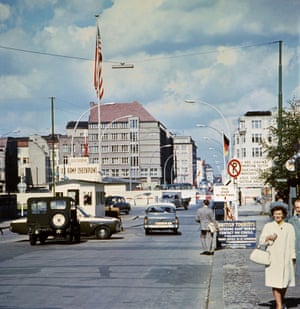
The famous Checkpoint Charlie crossing point, marking the border between East (Soviet sector) and West Berlin (American sector), 1968. Photograph:
Joel Robine/AFP/Getty Images
I had always known that the division of Germany would pass. I was the son of a Protestant pastor, and Protestant eastern Germany, the land of Luther and Bach and Zinzendorf, was my Germany just as much as the Catholic Rhineland was. In the 1960s I studied in West Berlin, had friends in East Berlin and went there regularly until I helped my girlfriend escape from East to West and risked arrest and imprisonment if I set foot in East Berlin again. When the relationship between the Federal Republic and the GDR normalised and I could once again travel there safely, I drove with my son through the East German cities and landscapes, poorer and greyer than their West German counterparts, sometimes in a lamentable state, but sometimes with a touching simplicity too – and, unlike West Germany, not ravaged by brutalist architecture and colourful advertising. We encountered the older Germany that could still be found there in those days and now no longer exists.
When I came back from Berlin to Bonn, where I was professor of public law at the university, I received an enquiry about teaching in East Berlin. One of my colleagues knew a colleague at Humboldt University and had the impression they were looking for a visiting professor from the West now that the wall had fallen. He couldn’t take it on himself, for he couldn’t stand the winter air in East Berlin, where lignite was used for heating. I didn’t hesitate for a moment, travelled back to Berlin to introduce myself at Humboldt University, realised that they didn’t really want anyone from the West, but thought that they were supposed to, and I settled for that.
That was how I ended up teaching a class on fundamental rights and another on constitutional theory in January 1990 as the first visiting professor from the Federal Republic of Germany to teach at Humboldt University. After the second session, a colleague invited me to participate as an expert in deliberations to draft a new constitution for the GDR. Over the next two months, I shared the hopes involved in drafting the new constitution. It was intended to be a free, constitutional, democratic underpinning for the GDR that would preserve the legacy of the peaceful revolution, allowing the GDR to enter into reunification negotiations with self-assurance and confidence. It was meant to be a contribution to reinventing Germany. In March, however, after the first and last free elections in the GDR, it was clear that reunification would come so quickly that plans to develop a new GDR constitution were already obsolete.
In March, the love-fest between the two Germanies also drew to a close. The economic problems involved in reunification became apparent. Switching from life under socialism to life in a capitalist system was not easy for many East Germans, and it became clear that their experiences and knowledge were unappreciated, while the penalties imposed on those who had spied for the State Security Service affected both those who deserved them and those who did not. Advisers and visitors from the West were nicknamed “Besserwessis” (a pun on “Besserwisser”, the German term for “know-it-alls”); many of them were convinced that they did indeed know better and treated the East Germans as annoying, impoverished, helpless relatives. The wounds inflicted in that period have still not fully healed.
We did not reinvent Germany. We did not even reinvent Humboldt University, as we had hoped we would in 1990 and 1991; it has become a German university like any other. Many things have become more difficult in Germany. Often Germans from the new federal states in the east and the old federal states in the west act as if there were an awkward distance between them, reacting to their differences as if they were annoying rather than a blessing. But I have confidence in the future. Great gifts change your life and cannot just blithely be chalked up as a turn for the better; you need to get to grips with them. It remains a great gift that Germany is reunited, a gift I delight in over and over again – when I cycle through the Brandenburg Gate to Humboldt University, when I travel through Brandenburg, go hiking in the Elbe Sandstone Mountains or see the sun rise over the Baltic Sea in Rügen. Bernhard Schlink
Norman Ohler: ‘The fall of the wall was a source of kinetic energy that we lived off for years’
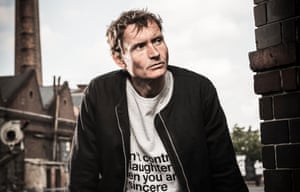
Norman Ohler was born in 1970 in the west German town of Zweibrücken. He is the author of three novels and two novellas and co-wrote Wim Wenders’s film Palermo Shooting. His bestselling non-fiction book, Blitzed, about the surprising reliance on drugs of the Nazi hierarchy, was translated into 18 languages. Ohler lives in Berlin.
It was the moment everything changed, and I became a writer.
Before then it had still been the 80s, the cold war, and it was clearly always going to be like that: the wall, which was after all a wall in people’s heads too, would never fall, and I, a politicised teenager at the time, was going to be a journalist – I would furiously attack the state of things in the progressive media: the propaganda, the cold war…
Even the day before the wall actually did come down in that moment of ecstasy, incredibly I didn’t have the slightest inkling. None of us did. And then it happened. And I’ll never forget how it happened. It was at about 7pm on 9 November 1989, during a really boring hour-long press conference [on live TV] by a second-rate politburo official called Günter Schabowski. Among other things, he answered questions about a new draft GDR travel law that he said also included some transit regulations. Schabowski himself could barely get through the GDR polit-speak of the text, and rustled his papers despairingly, cleared his throat helplessly a few times and eventually, because he wanted to get it over with, announced that in his view the freedom of GDR citizens to travel to West Germany applied with immediate effect, which, in spite of the unease that suddenly spread through the room – some journalists were open-mouthed – was nothing really special as far as he was concerned, since the GDR had always described itself as a democracy, the only form of society that guaranteed the freedom of its subjects.
The result of Schabowski’s confusion was that immediately after the end of the conference – when he did finally call it a day – hundreds of thousands of people in Berlin went out and knocked down the wall that same night. A Kafkaesque momentum had been set in motion, and this time it wasn’t lack of freedom that revealed itself, as usually happens in bureaucratic processes, but a fairytale breach that opened up.
At that moment I was 800km away in the small West German town where I was born, but I did have access to a car, and the next morning I called in at my grammar school to announce that I was taking the day off, sped up the autobahn and, seven hours later, reached Berlin just in time.
It was already getting dark as I climbed up on to one of those platforms that still stood around from before, from which West Germans would look over the wall into the east. Over there, everywhere I looked, a GDR soldier was kneeling on the wall and dividing the sections with a jackhammer – total rock’n’roll as well as an anticipation of techno – before a bulldozer came, with a kind of claw, to tear the segments individually out of the earth with military precision and then drive off with them somewhere at the back to dump them on the scrapheap of history. As each passageway was opened up it immediately filled with people who flowed in from east to west, and suddenly a young woman of 18 or so (the same age as me) was standing next to me, asking excitedly what was over there. “Well, East Berlin,” I replied, surprised, but she said she knew that already, she was from there, in fact, she had asked the question in a much bigger context. That was my first encounter with an East Berliner, and with her words she tore away something inside me that continues to define my life today.
It’s this idea of possibility. This transformation of hollow phrase and hackneyed term into a magically charged space – the change, for me personally, from journalist to writer and poet. The 90s began on that day, 9 November 1989, thanks to the inattentiveness of one police officer. The whole of world history was changed by a poetic moment at a press conference that was actually designed to exclude such moments. Since then anything has seemed possible to me, and my first three novels, about global revolution, the metropolises of New York, Johannesburg and indeed Berlin, emerged from the big bang that atomised the Berlin Wall. The fall of the wall gave Germany an incredible, positive boost, because for so many people who experienced it, myself included, it was a source of kinetic energy that they lived off for many years.
Of course that energy dissipated in the end, and we are now back in a situation in Europe in which we no longer have a warm welcome for refugees who manage to get over its walls, we no longer want to learn from them. Instead Europe has slipped into a xenophobic rigidity that wants separation rather than unification. So we need new collective experiences that will give us back the strength that the politicians – as privileged people who can travel freely – have systematically tried to steal from us. We need people in the streets who will physically work for change. It wasn’t capitalism that won in the fall of the Berlin Wall, but a human need for freedom. Our future is much too precious to be left to politicians and their empty words. Translated by Shaun Whiteside
Julia Franck: ‘Berlin today is a city of enthusiastic dreamers – with several jobs each’
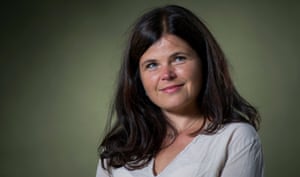
Julia Franck is the author of five novels including The Blind Side of the Heart, a family drama set in postwar Germany, which won the German book prize and sold over a million copies in Germany alone. She was born in East Berlin in 1970 and still lives and writes in the city.
All I know of Germany is a small fragment: Berlin. Thanks to the curiosity of a lot of people from far away, and the hopes and dreams they brought with them, over the past 30 years this city has rapidly changed and internationalised like no other in Germany. Of all major European cities, Berlin is perhaps not only the youngest, but the one with a thousand broken bones; the craziest one, the one with the most tangible and visible scars left by wars and culture. It is like a poor, beautiful woman, dressed up and wearing makeup, but squalid and scruffy – she needs visitors, tourists and lovers to keep her going with their fantasies and money. Whether you seek a retreat into ascetic silence or anonymity, or the passionate thrill of nightlife – anything is possible here. Though Berlin’s economy lies idle, tourism and foreign investors have cranked up the property market to unreachable heights. Berliners scarcely have jobs, pensions or savings that would make life in the city viable in the long term. But Berlin belongs to visionaries, dreamers and individualists from all over the place who either bring money with them or struggle, modestly and ambitiously, to survive in their particular niches. Students and artists get by, enriching the city with their inexhaustible creativity and self-exploitation, living hand to mouth while working on their concert or video or 1,000-page novel.
Our family lived barely four kilometres from the west, with only the Spree and the wall, with its threat of deadly punishment in between. When the wall was built in 1961 and sealed with orders to shoot on sight, my uncle, 18 at the time, killed himself. In 1972, my 21-year-old aunt fled to the west in an empty fuel tanker. My single mother made her first application for an exit visa in 1974. After a ban on employment and various other kinds of chicanery, her application – for herself and her daughters, four of them at the time – was finally authorised in 1978. The five of us lived for almost nine months in a single room in Marienfelde refugee camp in west Berlin, the destination for all eastern European cold war refugees. It was a long time, even after we were granted asylum, before we felt properly integrated. The camp still exists, and has been used often in the 30 years since the fall of the wall: in the early 1990s, for emigrants from the former Soviet Union and Poland, later for war refugees from the Balkans and other parts of eastern Europe, and today for refugees from Syria and south-east Europe. In 2014 there was a surge of violence in the camp, when about 100 Muslim Chechens beat up 30 Syrian Christians. The situation in camps, with people of different origin, religion and perspective, is never easy. Yet the countless people who have come to Germany from all corners of the planet over the past 30 years have enriched it hugely.
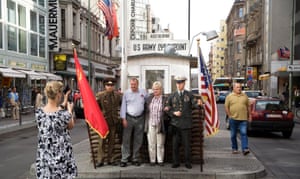
After the war, the divided Germans, supervised and strongly supported by the Allies, set up a new form of democratic state in west Germany and an astonishing economic miracle developed, offering those born there in the postwar period the promise of self-advancement. My generation in the west grew up with the promise that things would only get better and better. But by the mid-80s, with growing globalisation, then perestroika and the fall of the wall and reunification, it became clear that the economic miracle was over: Germany’s favourite child, Federal Savings Bonds, were abolished, and after reunification the unemployment rate in some regions of the east rose to 25%, although it has been falling constantly since 2005 across the whole of Germany. There is a worsening shortage of permanent, well-paid jobs, and our generation’s pension expectations have declined sharply. Despite rising numbers of high-school graduations and improvements in final exam grades, literacy rates are falling, education in schools is deteriorating and failing to promote social integration, health insurance is more and more expensive, incomes are plummeting and, as in most countries, social inequality has worsened.
In the east, many people’s careers and lives were badly affected by the fall of the wall. Whole regions of the former GDR lie abandoned, because so many went to the west in search of work. While most west Germans were able to look forward to the legacy of their economic-miracle parents, hardly anyone in east inherits anything – they didn’t have private property or an economic miracle there. Instead they had the guardianship of the state – familiar from all dictatorships – whose watchful eye encouraged an attitude of entitlement and immaturity. Anyone who supported the system, anyone who worked for the Party or the Stasi, could make a career inside the system without making any great sacrifice in terms of time or intellect, and be sure of being provided for through their entire lives. With that security gone, there is no cushion for the economic downturn in the east. Such social and economic fissures, and the different forms they assume in east and west, make many people, particularly in the east, feel like the losers and victims of reunification. In the last elections people, having lost faith in both democracy and government, turned their backs on the big political parties and vented their defiance as Wutbürger – furious citizens. That should be taken as an alarm signal. These people who feel left behind radicalise themselves individually or flee to politically extreme parties. Their fear of the future finds expression in rage and hatred at “fake news”, the government and immigration. Today some Germans in both east and west see reunification as a mistake.
Berlin, though, as a formerly divided city, occupies a special place in all this. Here we see a growth in the Prekariat – those with little purchasing power, who live a precarious existence on the poverty line. The sort of people who come to Berlin are looking more to pursue their independent social, creative or political vision than for promises of security and financial gain. “You can’t want to incur losses?” said my first and last financial adviser, to which I replied: “Yes, that’s exactly what I want and have to do.” My €5,000 shares were now worth only half that, but I had to pay my rent, I’d missed out on a job and I needed to finish a book.
In spite of the crash and social and democratic crisis, we still live in one of the wealthiest and the freest countries in the world, our taps produce clean drinking water, our rubbish is full of discarded food and we live in precious peace. If I’ve had 10 bikes stolen in Berlin in the past eight years, I see this irritation as a tribute to our free, wild city. I’d rather have a bicycle nicked once a year than give up cycling or live in a surveillance state with gated residential communities, in houses and streets with cameras, armed security staff and the death penalty. At the moment, unemployment in Berlin is only 8%, but with all their many jobs Berliners still earn much less than people in west Germany. Rents and prices are soaring, and yet in Berlin only 14% live in their own properties, 52% of households are single occupancy, and the trend is rising. We are a city of enthusiastic dreamers who do several jobs on the side to pay the rent. We are lucky to be a diverse international metropolis, in which every language in the world is spoken and in which a culture of social tolerance means we are able to contain the conflicts that arise among us. Translated by Shaun Whiteside
- “Believe Your Eyes”, The Atlantic
- “Brooks and Capehart on Trump forcing allies to reevaluate ties with U.S.”, PBS NewsHour
- Issue of the Week: Human Rights, Economic Opportunity, War, Hunger, Disease
- “Iran signals fast trials and executions for protesters as death toll in crackdown goes over 2,500”, Associated Press
- “Joe Rogan breaks with Trump over ‘Gestapo’ ICE operations”, The Hill
- January 2026
- December 2025
- November 2025
- October 2025
- September 2025
- August 2025
- July 2025
- June 2025
- May 2025
- April 2025
- March 2025
- February 2025
- January 2025
- December 2024
- November 2024
- October 2024
- September 2024
- August 2024
- July 2024
- June 2024
- May 2024
- April 2024
- March 2024
- February 2024
- January 2024
- December 2023
- November 2023
- October 2023
- September 2023
- August 2023
- July 2023
- June 2023
- May 2023
- April 2023
- March 2023
- February 2023
- January 2023
- December 2022
- November 2022
- October 2022
- September 2022
- August 2022
- July 2022
- June 2022
- May 2022
- April 2022
- March 2022
- February 2022
- January 2022
- December 2021
- November 2021
- October 2021
- September 2021
- August 2021
- July 2021
- June 2021
- May 2021
- April 2021
- March 2021
- February 2021
- January 2021
- December 2020
- November 2020
- October 2020
- September 2020
- August 2020
- July 2020
- June 2020
- May 2020
- April 2020
- March 2020
- February 2020
- January 2020
- December 2019
- November 2019
- October 2019
- September 2019
- August 2019
- July 2019
- June 2019
- May 2019
- April 2019
- March 2019
- February 2019
- January 2019
- December 2018
- November 2018
- October 2018
- September 2018
- August 2018
- July 2018
- June 2018
- May 2018
- April 2018
- March 2018
- February 2018
- January 2018
- December 2017
- November 2017
- October 2017
- September 2017
- August 2017
- July 2017
- June 2017
- May 2017
- April 2017